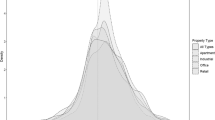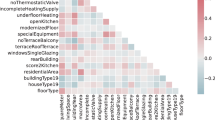Abstract
In apartment revenue management, rental rates for new and renewal leases are often optimized around a reference rent, which is defined as the “economic value” of an apartment unit. In practice, reference rents are usually estimated using some rules-based approaches. These rules are mostly intuitive to understand and easy to implement, but they suffer from the problems of being subjective, static, and lacking self-learning capability. In this study, we propose a reinforcement learning (RL) approach to estimating reference rents. Our intent is to find the optimal reference rent estimates via maximizing the average of RevPAUs over an infinite time horizon, where RevPAU (Revenue per Available Unit) is one of leading indicators that many apartments adapt. The proposed RL model is trained and tested against real-world datasets of reference rents that are estimated with the use of one rules-based approach by two leading apartment management companies. Empirical results show that this RL-based approach outperforms the rules-based approach with a 19% increase in RevPAU on average.








Similar content being viewed by others
References
Arnold, G.D., D. Mankowitz, and T. Hester. 2019. Challenges of Real-World Reinforcement Learning. arXiv:1904.12901 [cs.LG].
Bondoux, N., Q. Nguyen, T. Fiig, and R. Acuna-Agost. 2017. The End of Airline Revenue Management as We Know It? (Deep) Reinforcement Learning for Revenue Management. 57th Annual AGIFORS Symposium, 2017, Volume 2017—Conference Proceeding.
Gosavi, A. 2004. Reinforcement Learning for Long-Run Average Cost. European Journal of Operational Research 155: 654–674.
Gosavi, A., N. Bandla, and T.K. Das. 2002. A Reinforcement Learning Approach to a Single Leg Airline Revenue Management Problem with Multiple Fare Classes and Overbooking. IIE Transactions 34: 729–742.
Mahadevan, S. 1996(a). An Average-Reward Reinforcement Learning Algorithm for Computing Bias-Optimal Policies. AAAI-96 Processings.
Mahadevan, S. 1996(b). Average Reward Reinforcement Learning: Foundations, Algorithms, and Empirical Results. Machine Learning—Special Issue on Reinforcement Learning 22:159–195.
Noone, B.M., L. Canin, and C.A. Enz. 2012. Strategic Price Positioning for Revenue Management: The Effects of Relative Price Position and Fluctuation on Performance. Journal of Revenue and Pricing Management 12 (3): 207–220.
Pagliari, J.L., and J.R. Webb. 1996. On Setting Apartment Rental Rates: A Regression-Based Approach. Journal of Real Estate Research 12 (1): 37–61.
Raju, C.V.L., Y. Narahari, and K. Ravikumar. 2003. Reinforcement Learning Applications in Dynamic Pricing of Retail Markets. Proceedings of the IEEE International Conference on E-Commence.
Raju, C.V.L., Y. Narahari, and K. Ravikumar. 2006. Learning Dynamic Prices in Electronic Retail Markets with Company Segmentation. Annals of Operations Research 143: 59–75.
Rana, R., and F.S. Oliveria. 2014. Real-Time Dynamic Pricing in a Non-stationary Environment Using Model-Free Reinforcement Learning. Omega 47: 116–126.
Schwind, M., and O. Wendt. 2002. Dynamic Pricing of Information Products Based on Reinforcement Learning: A Yield-Management Approach. In KI 2002: Advances in Artificial Intelligence, ed. M. Jarke, G. Lakemeyer, J. Koehler. KI 2002. Lecture Notes in Computer Science, vol. 2479. Berlin: Springer.
Shihab, S.A.M., C. Logemann, D.G. Thomas, and P. Wei. 2019. Autonomous Airline Revenue Management: A Deep Reinforcement Learning Approach to Seat Inventory Control and Overbooking. arXiv:1902.06824v2 [cs.AI]. Accessed 13 June 2019.
Singh, S.P. 1994. Reinforcement Learning Algorithm for Average-Payoff Markovian Decision Processes. AAAI’94 Proceedings of the 12th National Conference on Artificial Intelligence, vol. 1, 700–705
Sirmans, G.S., and J.D. Benjamin. 1991. Determinants of market rent. Journal of Real Estate Research 6 (3): 357–379.
Sutton, R.S., and A.G. Barto. 2018. Reinforcement Learning: An Introduction, 2nd ed. Cambridge: The MIT Press.
Wang, J. 2008. A Realization of an Apartment Dynamic Pricing System. Journal of Revenue and Pricing Management 7 (3): 256–265.
Author information
Authors and Affiliations
Corresponding author
Additional information
Publisher's Note
Springer Nature remains neutral with regard to jurisdictional claims in published maps and institutional affiliations.
Rights and permissions
About this article
Cite this article
Wang, J., Das, M. & Tappert, S. Applying reinforcement learning to estimating apartment reference rents. J Revenue Pricing Manag 20, 330–343 (2021). https://doi.org/10.1057/s41272-021-00316-z
Received:
Accepted:
Published:
Issue Date:
DOI: https://doi.org/10.1057/s41272-021-00316-z




